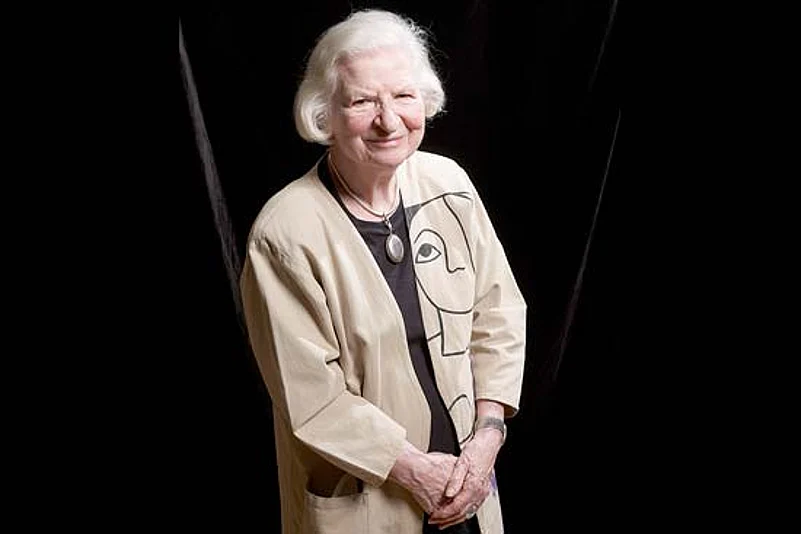Most crime fiction ends with successful police officers or private detectives hogging all the glory. Readers do not mind that. It’s unusual for a senior officer (commander at Scotland Yard) to explain to his colleagues after his special team had solved a particularly gruesome murder case, “If our future senior officers can’t show humanity, there’ll be no hope for any of us.”
Perhaps, the commander’s upbringing guided him. Adam Dalgliesh is portrayed as the son of a village parson and often accompanied his father on his duty rounds. A streak of Christianity can be detected in most of the Dalgliesh books authored by Baroness P.D. James who died last week at 94. No author, no detective pays so much attention to the victims as Dalgliesh. Even in the first novel where he appears (Cover Her Face, 1962), Dalgliesh gently reminds those present to cover the victim’s face. His team are quick to learn. No profanity, irreverent comments in the presence of the corpse. Perhaps the commander inherited this moral streak from his childhood.
And what about the writer herself, P.D. James? She had had her share of personal tragedies. Bright in studies, her entry into writing was delayed by an early marriage to a medical student and the outbreak of World War II. Always attracted to crime fiction, James often wondered if ‘Humpty Dumpty had a great fall or was he pushed from behind’. Since her government job did not give her much time, she worked in the mornings to produce her first novel, Cover Her Face. After the death of her husband in 1964, James passed the civil service exams, joined the home ministry and became an administrator in the Forensic Science and Criminal Law division. Finally, she had the time to acquire a fund of knowledge in crimes, investigation, medical details and legal procedures. Honing her skills to frame plots and, more importantly, create appealing characters, James produced about 19 best-selling novels, establishing in the process one of the 20th century’s most famous sleuths, Adam Dalgliesh, who rose from superintendent to the high rank of commander of Scotland Yard. James often hinted that Dalgliesh started from the bottom, as a beat constable. And like her fictional counterpart, she rose to become one of the ‘queens’ of crime fiction, along with greats like Agatha Christie, Ngaio Marsh and Dorothy L. Sayers.
Dame Agatha, the most popular and prolific of them all, wrote in an era when women writers were expected to eschew violence in their books. When a family friend, who was a member of the Mountbatten family, asked the writer to have “more blood” in her novels, Agatha produced Hercule Poirot’s Christmas where the stabbed victim bled profusely, eliciting the comment from one of the characters, “Who would have thought the old man would have so much blood?” Now, there was no stopping Agatha. The villain in Murder in the Orient Express was stabbed 12 times! The writer gave up ‘poisoning’ her victims (she had experience working with a chemist) and switched over to more violent methods.
Working in an age when gruesome violence had become common, P.D. James had no such inhibitions. In fact, one of her best novels, A Suitable Job for a Woman, which featured not Dalgliesh but 21-year-old private detective Cordelia Gray, is one of the most disturbing books I have ever read. Why did Mark Callender suddenly leave Cambridge and work as a gardener when he was on the verge of getting an inheritance, why did he choose a William Blake poem as his suicide note? Cordelia stumbles from one twisted fact to another—false pregnancy, blood groups, menacing garden well without a cover.... The truth is so shattering that she readily goes back to her old job, finding lost pet cats and dogs.
This is one of the most unusual psychological thrillers I had ever read. Why was it that James gave up Cordelia for Dalgliesh after only two books—though the second one, Skull Beneath the Skin, wasn’t a patch on the first book? Was it because she was not impressed with Cordelia’s parentage, and because her father was an itinerant Marxist poet and amateur revolutionary?
Come to think of it, the two best P.D. James novels did not feature Adam Dalgliesh. Innocent Blood, published in 1980, pushed James to stardom. My choice as the most unpopular heroine in crime fiction is Philippa who gives up the loving home of her adopted parents and goes searching for her “real” parents, despite the gradual realisation that the past was best left untouched. Philippa seemed lacking in common sense, set on a wild goose chase which was sure to end in tragedy. But the book has that other rare quality—unputdownability. Like most of James’s novels, this one is loaded with evil, most of it from the past. The more one dug out, the more horror it generated.
In fact, most of the evil in James’s books lies in the past. No wonder then that every novel is loaded with flashbacks, one of them even to an age when women were branded as witches and burnt at the stake. Subplots are also often woven into the past. The problem here is that, more often than not, the subplots look more interesting than the main ones! Perhaps, the author was helpless and unable to halt this tendency. Unwillingly we are dragged into the past, often gasping for breath but captive to her words. Other female crime writers (men and women) have achieved the same effect, but not with the same finesse as James.
While reading James, I often think of my other favourite topcop, Roderick Alleyn, created by Ngaio Marsh. It’s a neck ’n neck race but Dalgliesh has better plots to sustain him, though as a person, Alleyn appears to more likeable. Both are excellent detectives, and rely on teamwork. Alleyn’s team functions more as a family and Alleyn is always ready for a joke, quick with praise for a job well done. The Alleyn-Fox (detective inspector) combination reminds me of Holmes and Watson. New Zealand-born Marsh often switches her plots there, which can be unsettling. As for love and courtship, Alleyn reminds one of the medieval hero who often pronounces himself unfit even to kiss the hem of his sweetheart’s gown. Being more a contemporary and a Scotland Yard product, the Commander has a better idea on policing problems, terrorism threats, VIP security reforms and other such modern calamities.
Dalgliesh (“AD” to his colleagues) is much more dignified, demanding and sober. The members of his crack investigative team respect rather than like him. The son of a preacher, he never lets anyone forget the fact. A true professional, he has policemen and women competing with one another to be part of his team. If at all he has a favourite, it is his No. 2, Kate Miskin, who has also risen from the ranks. Unlike Marsh, James gives details of AD’s team as well and we feel we know more about them than Fox and co. Kate is hopelessly in love with her boss, who is only prepared to treat her as a valuable team member. In the 19 books, Dalgliesh is shown falling in love thrice. Well, the end comes with the wedding of the Commander with Emma Leavenham. The couple share a deep love for literature, and now that James is no more, we can leave them to their literary pursuits and to raising a family.


















.png?w=200&auto=format%2Ccompress&fit=max)







